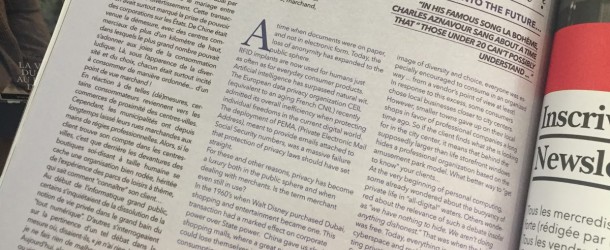“IN HIS FAMOUS SONG LA BOHÈME, CHARLES AZNAVOUR SANG ABOUT A TIME THAT “ THOSE UNDER 20 CAN’T POSSIBLY UNDERSTAND … ”
A time when documents were on paper, and not in electronic form. Today, the loss of anonymity has expanded to the public sphere.
RFID implants are now used for humans just as often as for everyday consumer products. Artificial intelligence has surpassed natural wit. The European data privacy organization CEIL (equivalent to an aging French CNIL) recently admitted its overall ineffi ciency when protecting individual freedoms in the current digital world. The deployment of PEMA, (Private Electronic Mail Address), meant to provide emails attached to Social Security numbers, was a massive failure that protection of privacy laws should have set straight.
For these and other reasons, privacy has become a luxury both in the public sphere and when dealing with merchants. Is the term merchant even still in use?
In the 40’s when Walt Disney purchased Dubai, shopping and entertainment became one. This transaction had a marked effect on corporate power over State power. China gave us sky-high shopping malls, where a great number of visitors could lose themselves in a sea of entertaining consumption. In this setting, and under the image of diversity and choice, everyone was especially encouraged to consume in an organized way … from a vendor’s point of view at least!
In response to this excess, some consumers chose local businesses closer to city centers. However, smaller towns gave up on their local shops in favor of professional companies a long time ago. So if the client finds what she is looking for in the city center, it means that behind the supposedly larger than life storefront windows hides a professional organization based on the amusement park model. What better way to “get to know” your clients…
At the very beginning of personal computing, some already wondered about the buoyancy of private life in “all-digital” waters. Others wondered about the relevance of such a debate insofar as “we have nothing to hide. We aren’t doing anything dishonest.” That was when the Internet was free. Today, everything is marketable, in cyberspace and real life. The question of protecting private life is more pertinent than ever. The States have already surrendered to corporations. So, will the citizen-consumer be able to defend his rights?
Text published in Silex ID #6



















Comments are closed.